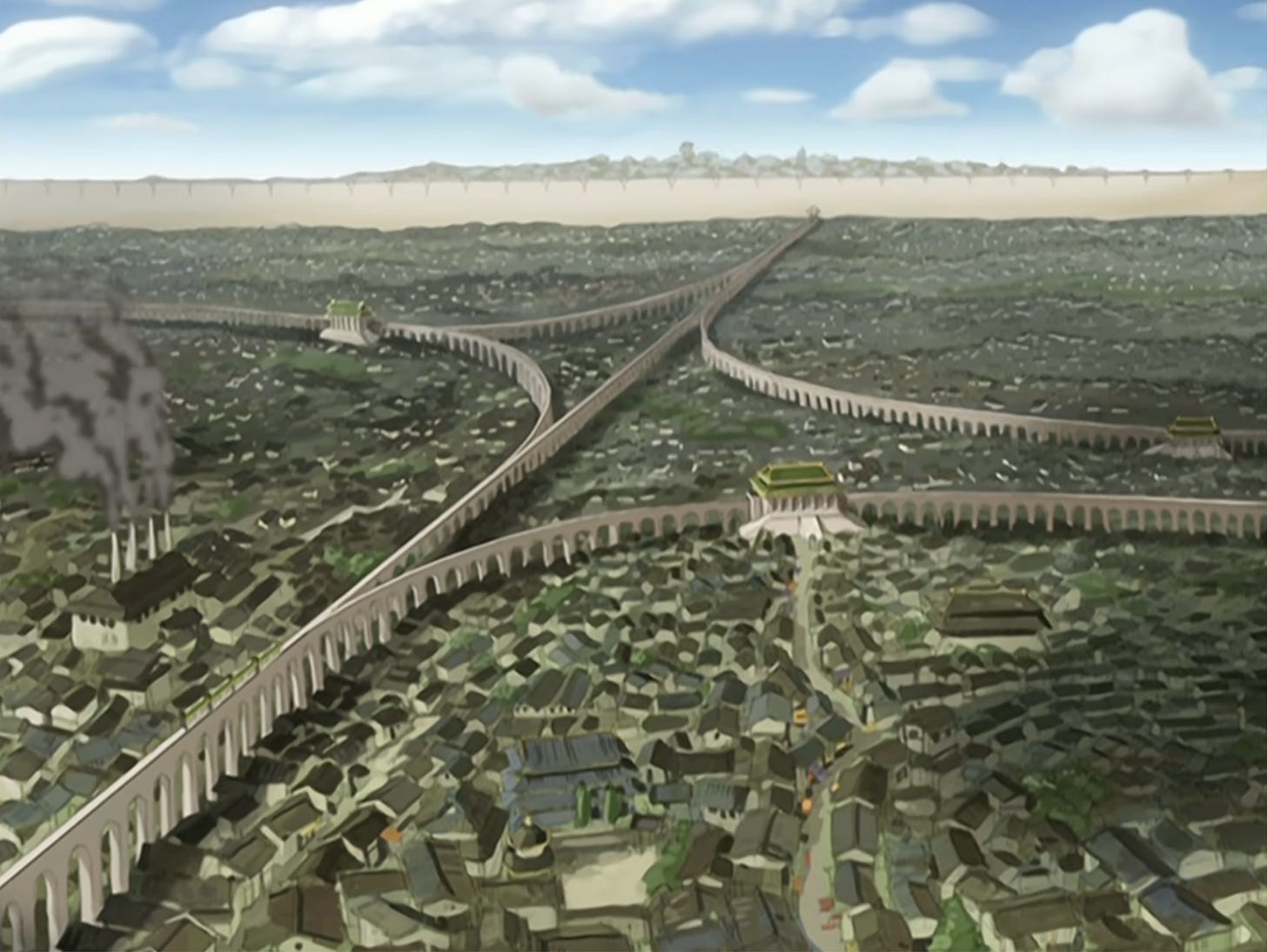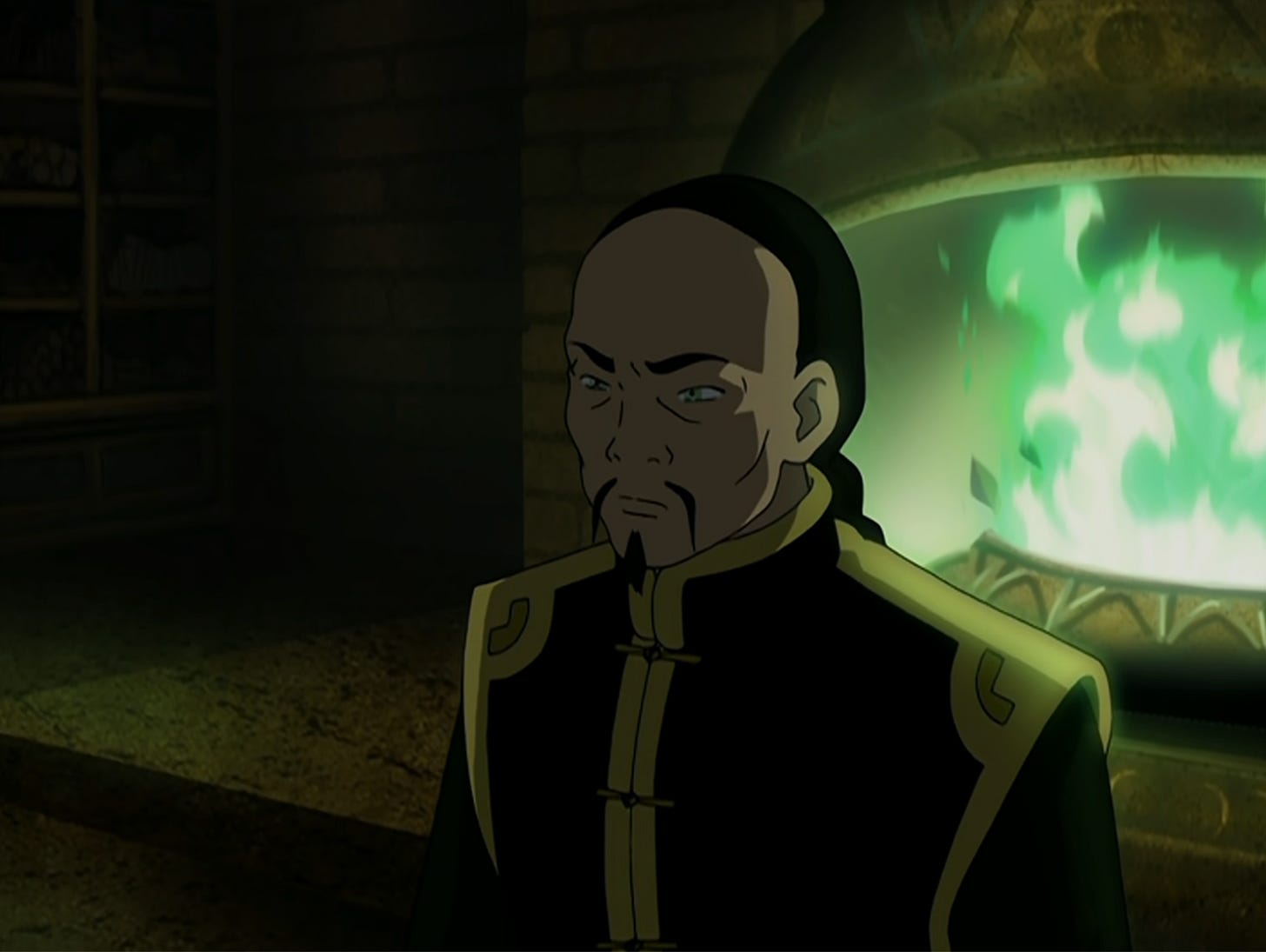Thanks for tuning in to my thirty-fourth of 61 daily reviews of Avatar: The Last Airbender! Yesterday, we watched S2E13: The Drill.
In our first episode within the inner walls of Beijing-inspired Ba Sing Se, Team Avatar is raring to begin their search for Appa and to tell the Earth King about the upcoming solar eclipse. But the city, vast beyond comprehension compared to Sokka and Katara’s podunk South Pole village, is not raring back. “It's just a bunch of walls and rules,” explains Toph, who apparently has been here before, thanks to her highborn lineage (but didn’t her parents keep her locked up at home?).
The kids are greeted at the train station by the uncannily smiling Joo Dee, who watches them closely as she guides them through a sanitized tour of the city. While Avatar has only touched on poverty obliquely so far, the wealth disparity in the Earth Kingdom capital is on full display as they pass through the Lower Ring, a squalid, under-paved, and overcrowded area which Joo Dee calls “quaint and lively.” The Lower Ring, which houses refugees and tradespeople, is separated from the middle- and upper-class neighborhoods by a giant wall that helps “maintain order.”
As they ride, Joo Dee nimbly evades (or more accurately, flat-out ignores) all of Sokka’s pleas that they need to see the Earth King. And later, as the Gaang wanders around trying to ask locals about Appa and about the Fire Nation, she stands behind them and silences the nervous citizens with a dagger-like stare and a surreptitious shake of her head. What’s her agenda? Away from their guide’s prying eyes, a slightly less reticent official warns, “you can't mention the War here.” He also tells them to stay away from the Dai Li, the “cultural authority” (read: secret police) of Ba Sing Se, before slamming the door in their face.
Now we cut to Zukoland, which for once is only a few order-preserving walls away from Team Avatar. Iroh has gotten both of them an apartment (somehow) and jobs at a mismanaged tea shop in the Lower Ring, where he quickly turns it around into one of the finest teahouses in the city. The kindly uncle takes quickly to his new home, also the site of his greatest military failure. But his typically angsty nephew feels trapped in the city and doesn’t want to settle in. Iroh counsels him:
Life happens wherever you are, whether you make it or not.
Meanwhile, Jet’s suspicions about the two firebenders blossom into a full-blown obsession as he stalks them and stakes out their home to gather evidence. Even if he’s right, it looks like the former freedom fighter hasn’t changed as much as he thinks. Smellerbee and Longshot try to advise him to let it go. But Jet snaps and storms into the tea shop to start a wonderfully-choreographed fight with Zuko, who snatches a customer’s conveniently-holstered dual swords. There’s a Jackie-Chan-like highlight where the prince kicks a table at Jet, who cuts it in half, and then slashes the table Zuko is standing on as he jumps to the other half.
Returning to the Upper Ring, the Gaang cooks up a plot to sneak into a party that the Earth King is throwing for his pet bear. (They can’t comprehend that it’s not a skunk bear, or an armadillo bear, or even a gopher bear. Just… bear.) Toph and Katara pretend to be socialites, and the bumbling Aang and Sokka disguise themselves as busboys. But Joo Dee is there waiting, and she looks petrified when Aang blows his cover and makes a scene.
The Earth King arrives, hidden within his palanquin, and Aang moves to greet him. But he’s deftly intercepted by a line of guards, flanking a queue-wearing man who introduces himself as “Long Feng, Grand Secretariat of Ba Sing Se and head of the Dai Li.” At the same time, the Dai Li quietly seize Sokka, Katara, and Toph by grabbing them from afar with their creepy earth hands.
With the Team Avatar’s attention, the powerful official drops a shocking revelation that he is the true ruler of the city and controls its military. The king is a figurehead who issues decrees on maintaining Ba Sing Se’s “cultural heritage.” Sokka tries to tell Long Feng about the solar eclipse, but the Grand Secretariat cuts him off. He explains strictly that the War is not to be mentioned within the walls.
Constant news of an escalating war will throw the citizens of Ba Sing Se into a state of panic. … In silencing talk of conflict, Ba Sing Se remains a peaceful, orderly utopia: the last one on Earth.
As he’s talking, we cut back and forth to Jet, who’s been apprehended by the Dai Li after his assault at the teahouse. Two agents carry him into a dark cell and restrain him with a circle of rocks around his forehead. A lantern circles around in front of the gagged renegade, and his eyes widen as an agent chants a foreboding mantra. Jet’s muffled pleas subside as the brainwashing takes effect.
There is no war within the walls. Here we are safe. Here, we are free.
So much happens in this episode, but the pacing is breezy. City of Walls and Secrets masterfully paints a vibrant and textured picture of Ba Sing Se, which feels both utterly fantastical and more realistic than most places in Avatar. That seeming contradiction is an appropriate match for the new dimension of intrigue that this episode brings to the series. It was my first encounter with an aesthetic of surveillance and misinformation I would later come to associate with Orwell’s Nineteen Eighty-Four.
The Grand Secretariat’s introduction is a perfect twist for this show, which has continuously labored to shrug off the false dichotomy of good and evil. Long Feng, with a sinister green fire blazing behind him, quickly establishes himself as a truly formidable Earth Kingdom antagonist (far more than the hapless General Fong from The Avatar State). Just as the audience should look for the good in all four nations, they would do well to remember that nefarious and power-hungry types know no borders, either.
Long Feng leaves them with a veiled warning. “I understand you've been looking for your bison. It would be quite a shame if you were not able to complete your quest.” Aang, clearly upset, has no comeback — he doesn’t know how to respond to a threat that’s only subtext. Team Avatar may be strong fighters, but without any political savvy, they’re totally out of their league here. The power in a booming city like this one does not roar from the rooftops. It slinks quietly through the alleyways, hangs heavy in the air, passes shrewdly through a pointed glance. Can our protagonists learn the game, too, or will they be outmatched by a better player?
See you tomorrow for Episode 15: The Tales of Ba Sing Se! Share your own thoughts on this episode in the comments.
Spare observations
Earthbending powered trains. Sick!
“This tea is nothing more than hot leaf juice!” “Uncle, that's what all tea is.” “How could a member of my own family say something so horrible?”
The Dai Li are named after a feared minister of military intelligence in Republican China, who adopted the same name. The phrase refers to “an assassin’s hooded veil” in Chinese, and also inspires their signature black hats.
The nervous student says to see Professor Zei, the same guy from The Library. About that…
“Good evening, Mr. Sokka Water Tribe, Ms. Katara Water Tribe, Lord Momo of the Momo Dynasty. Your Momo-ness.” “Avatar Aang, how you do go on!”
“Quiet! You don’t know what I had to do to get seats this near the bear!”
The writers reuse the Lee and Mushi joke. “I’m Hwamei, and this is… Dung.”
Friends of the White Lotus [SPOILERS]
The man holding the scimitar who leers at the Gaang in the Lower Ring might be the same guy who tries to mug Iroh in The Tales of Ba Sing Se. Or they might have just reused the character design, because on my screen, this man seems to be bald, while the guy in that scene has hair.
“I just want our place to look nice, in case someone brings home a lady friend!” Casual foreshadowing for The Tale of Zuko next episode.
The Dai Li were actually founded by Avatar Kyoshi to protect the Earth King.
The Earth King’s bear is named Bosco. He’s a sweetie.
What Long Feng fails to mention: covering up the war doesn’t just prevent panic. It also keeps the Earth King himself in the dark, ensuring the Dai Li chief’s continued grasp on power. But many people in the city do seem to at least know an inkling about the war, based on their reactions to Joo Dee.
In Lake Laogai, it’s revealed that there’s a whole troop of Joo Dees.
This episode’s direction flirts with psychological horror and the aesthetics of the uncanny in a way that the series hasn’t done much, except with Koh the Face-Stealer. The idea of losing control over body and mind is rife territory that the creators will explore further in Lake Laogai, The Puppetmaster, and later in Korra.








